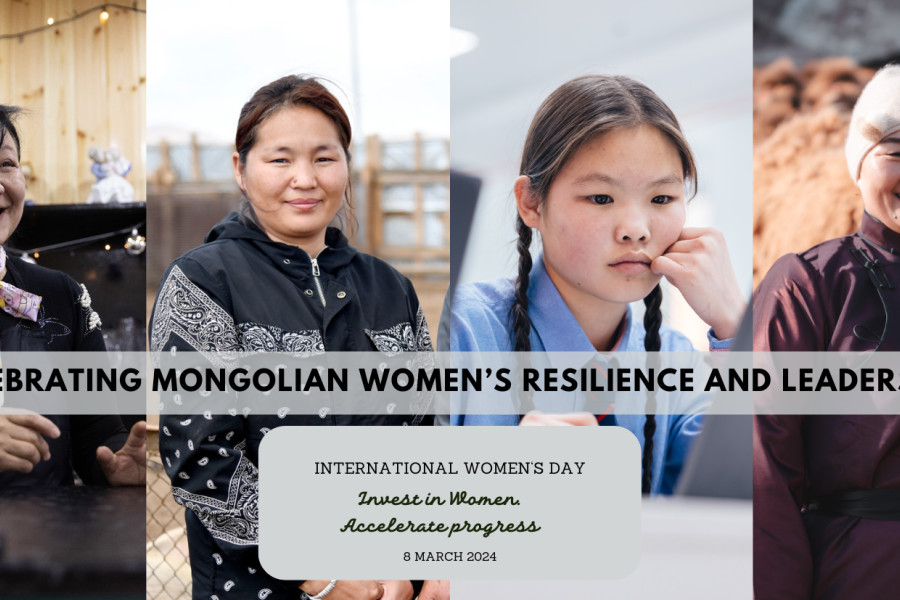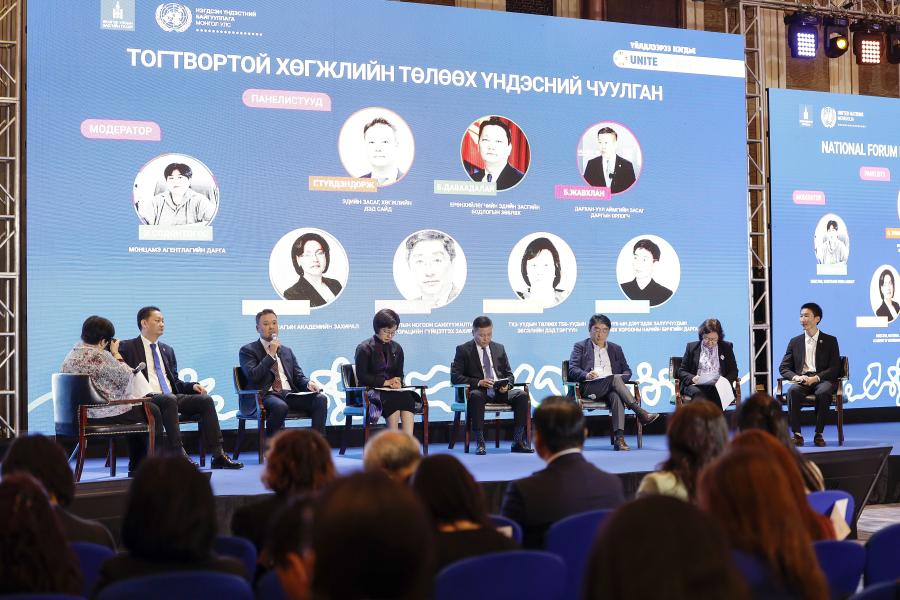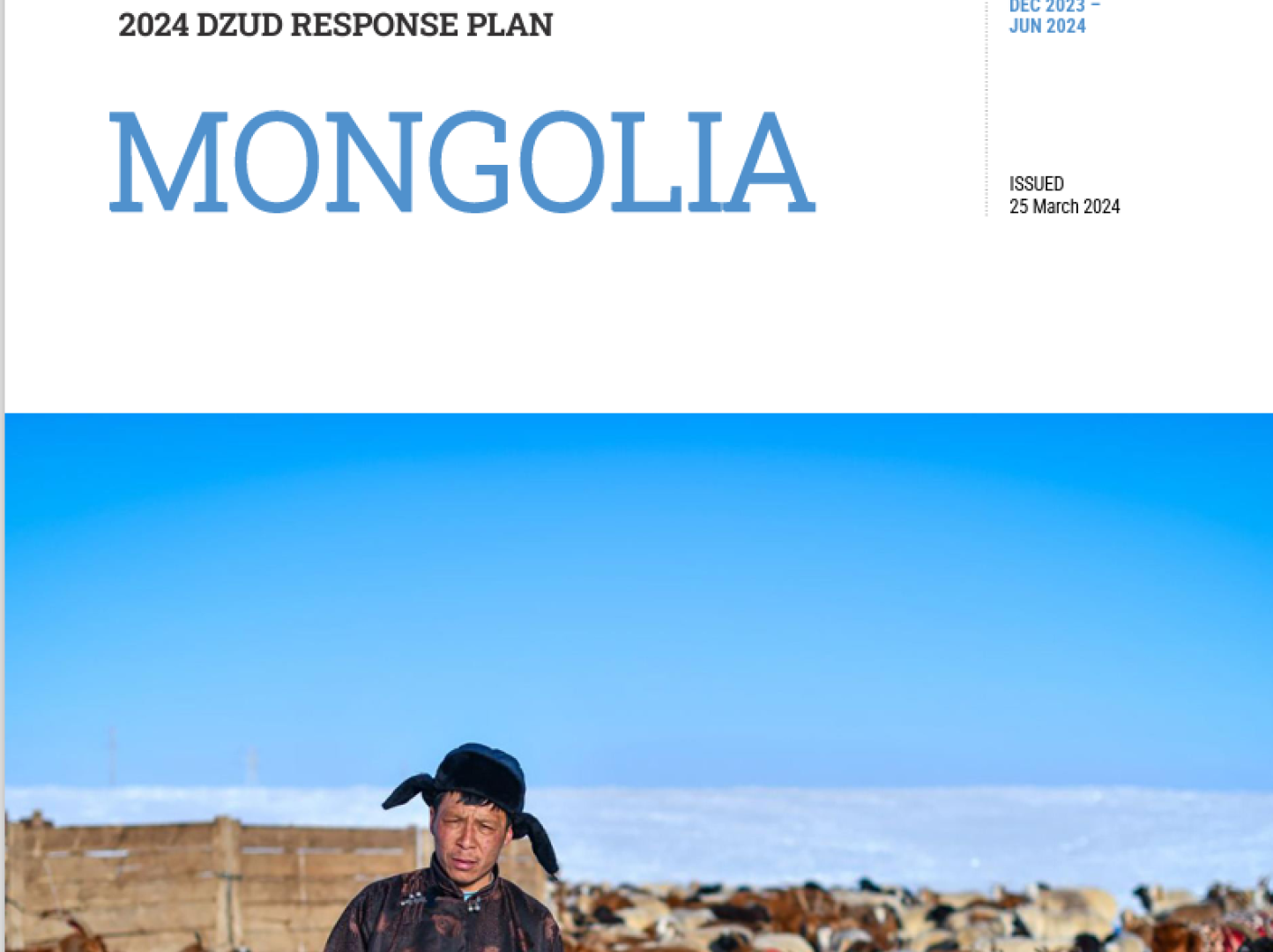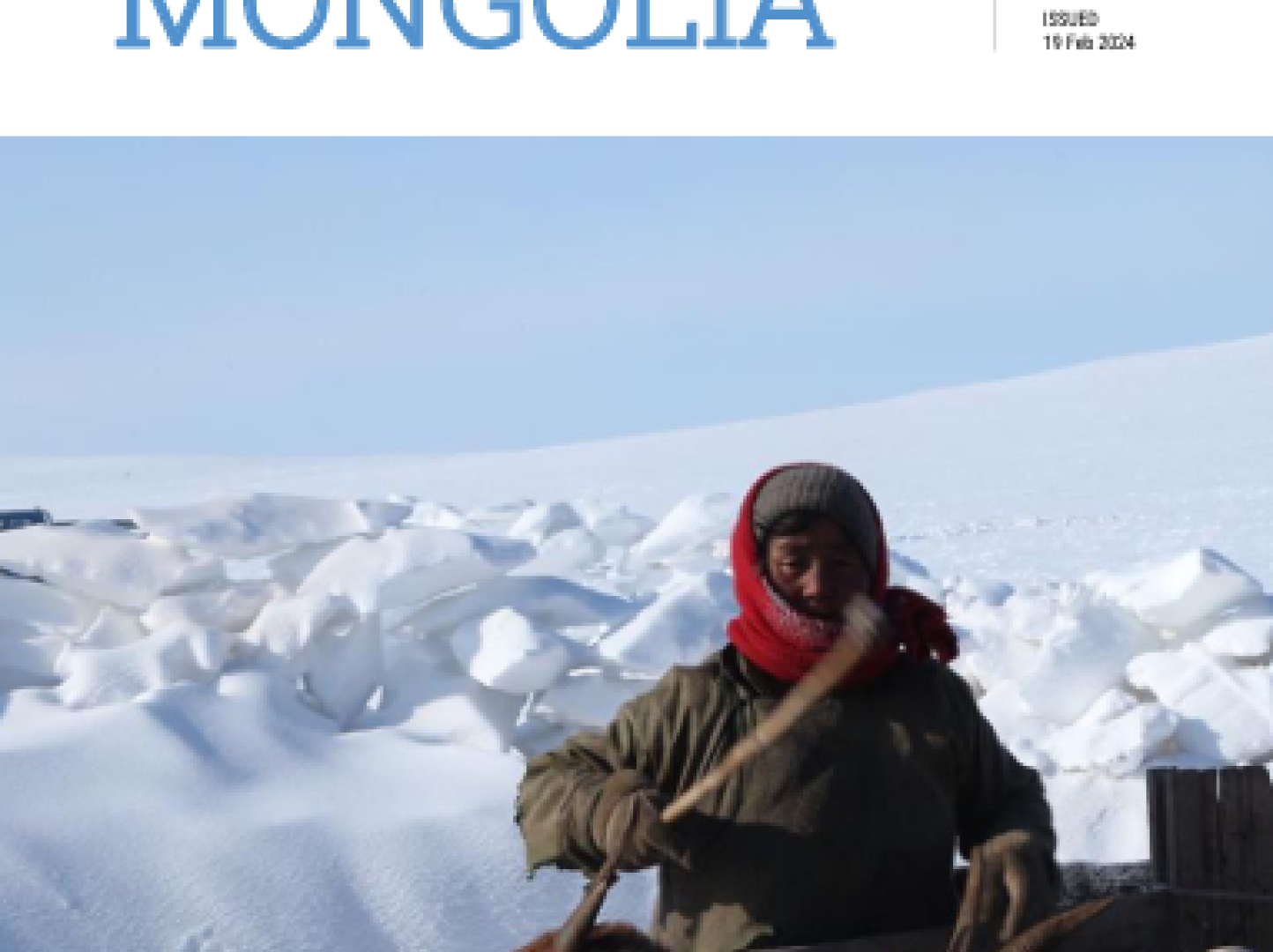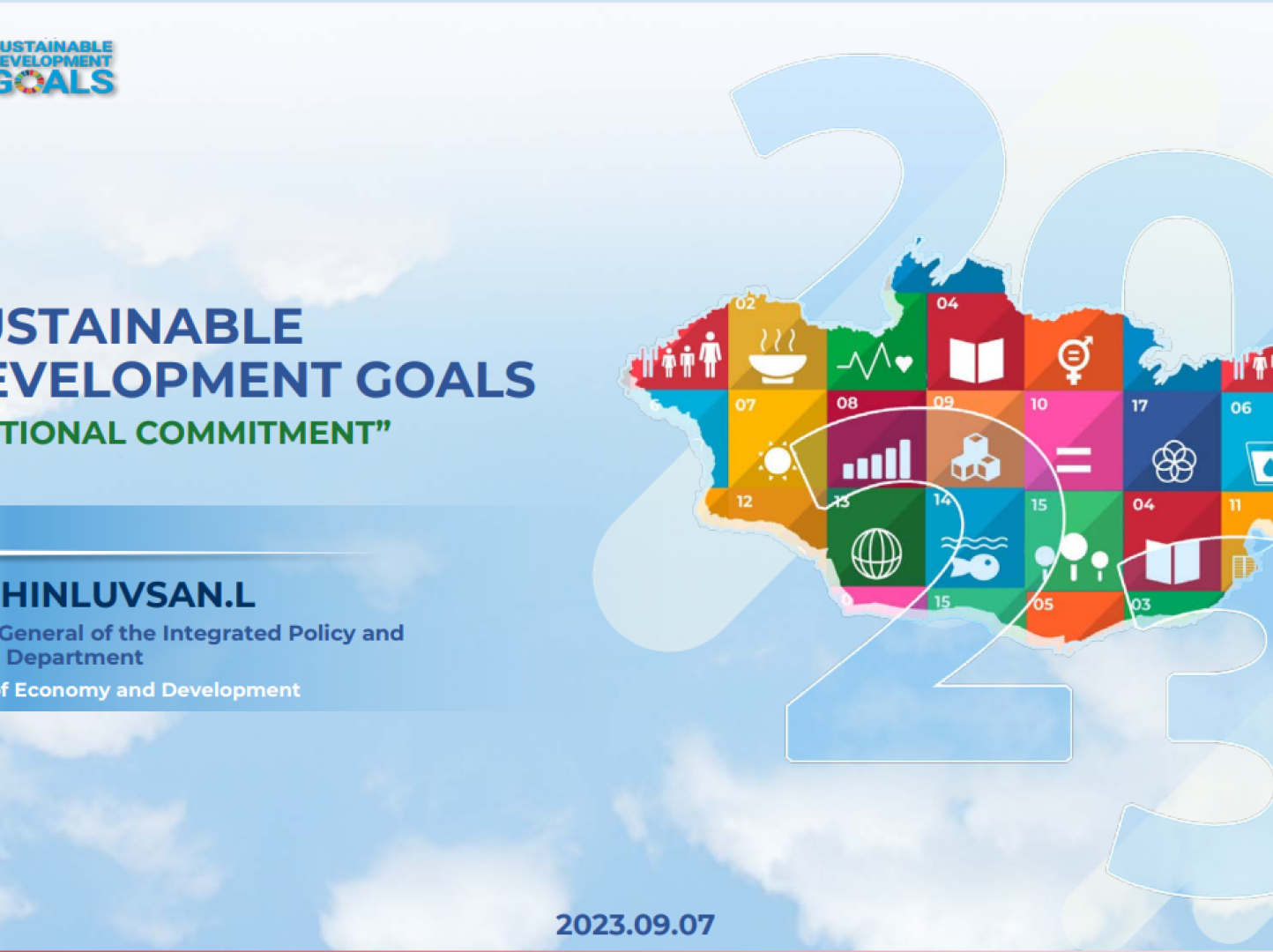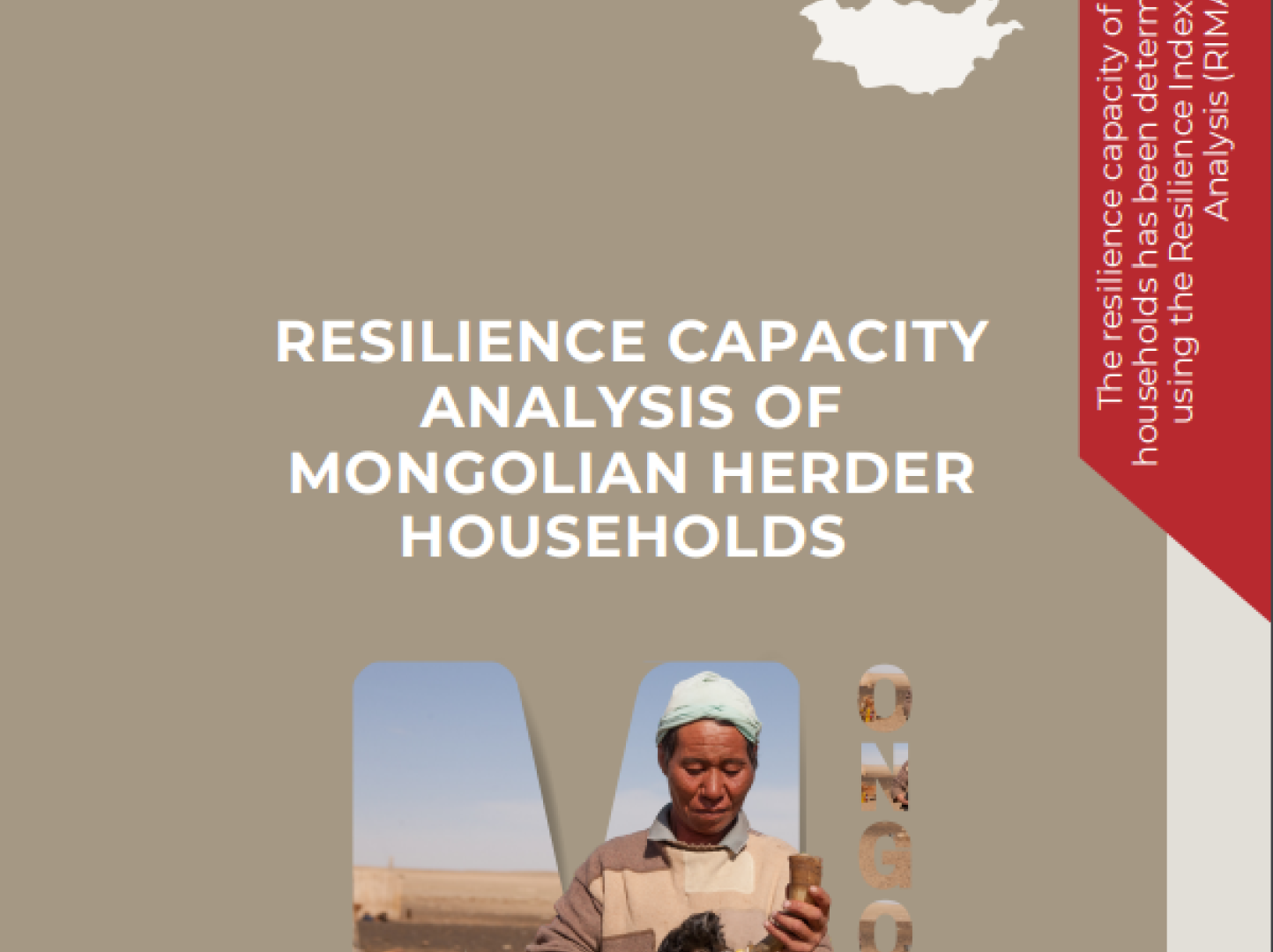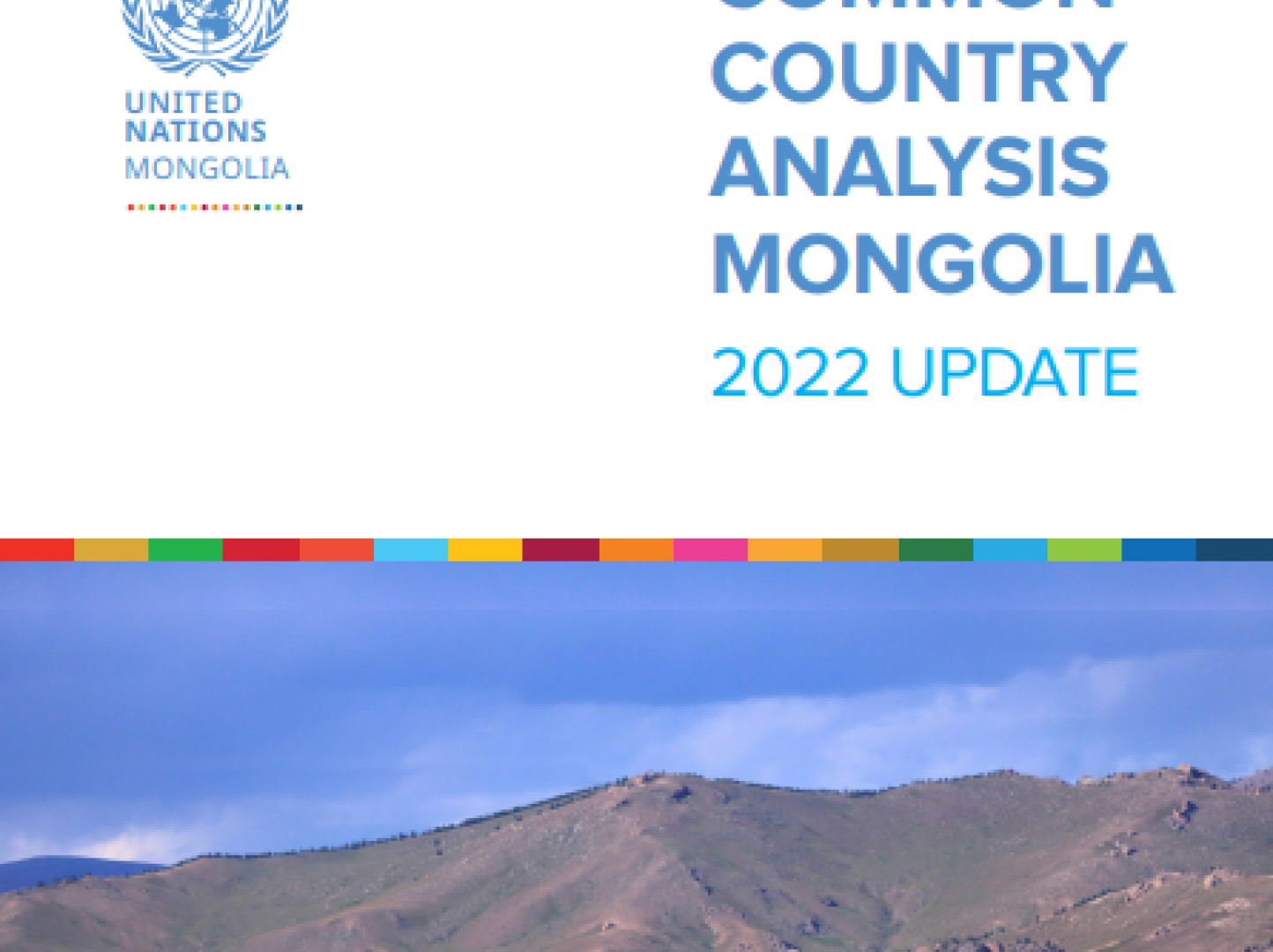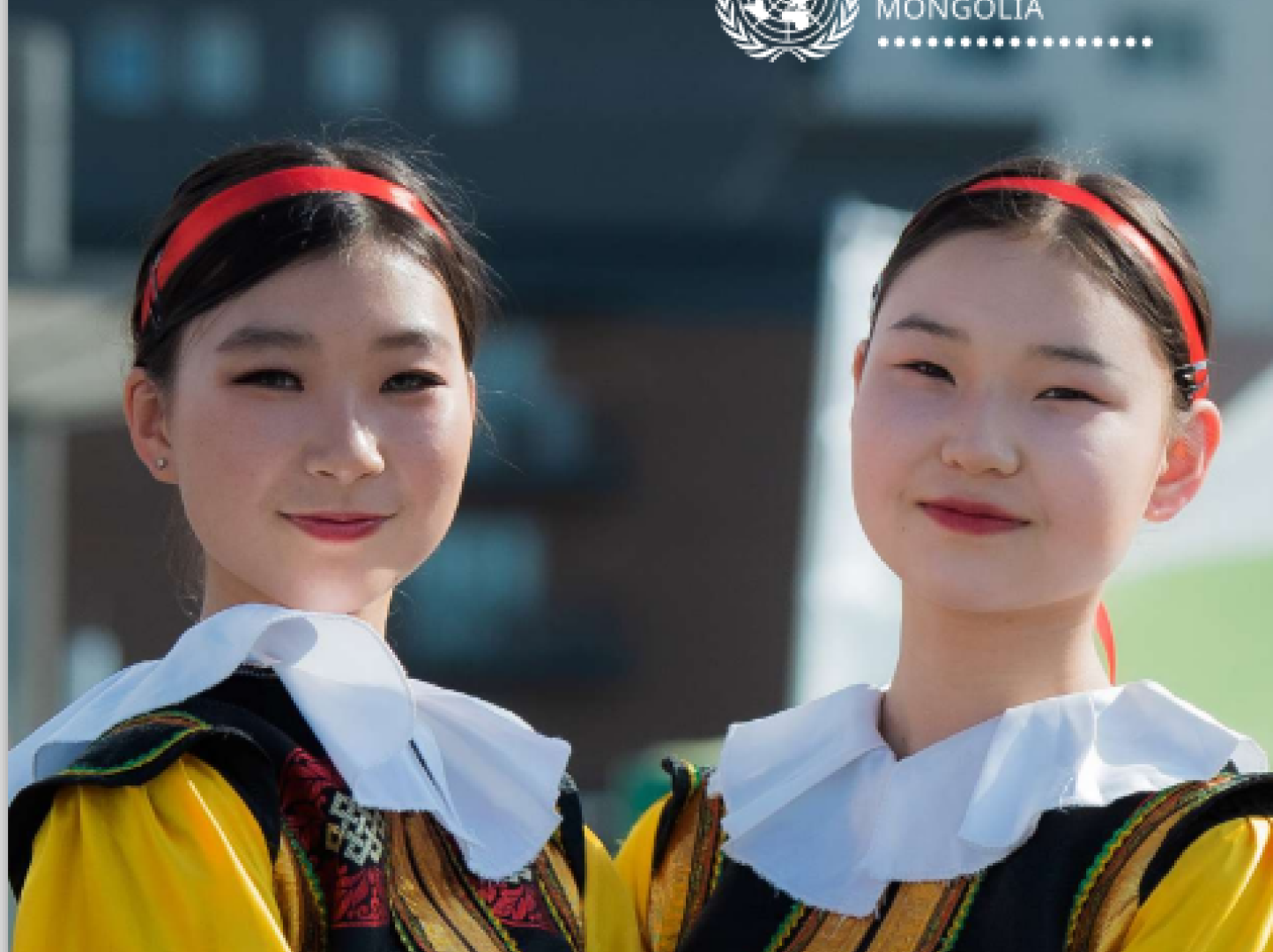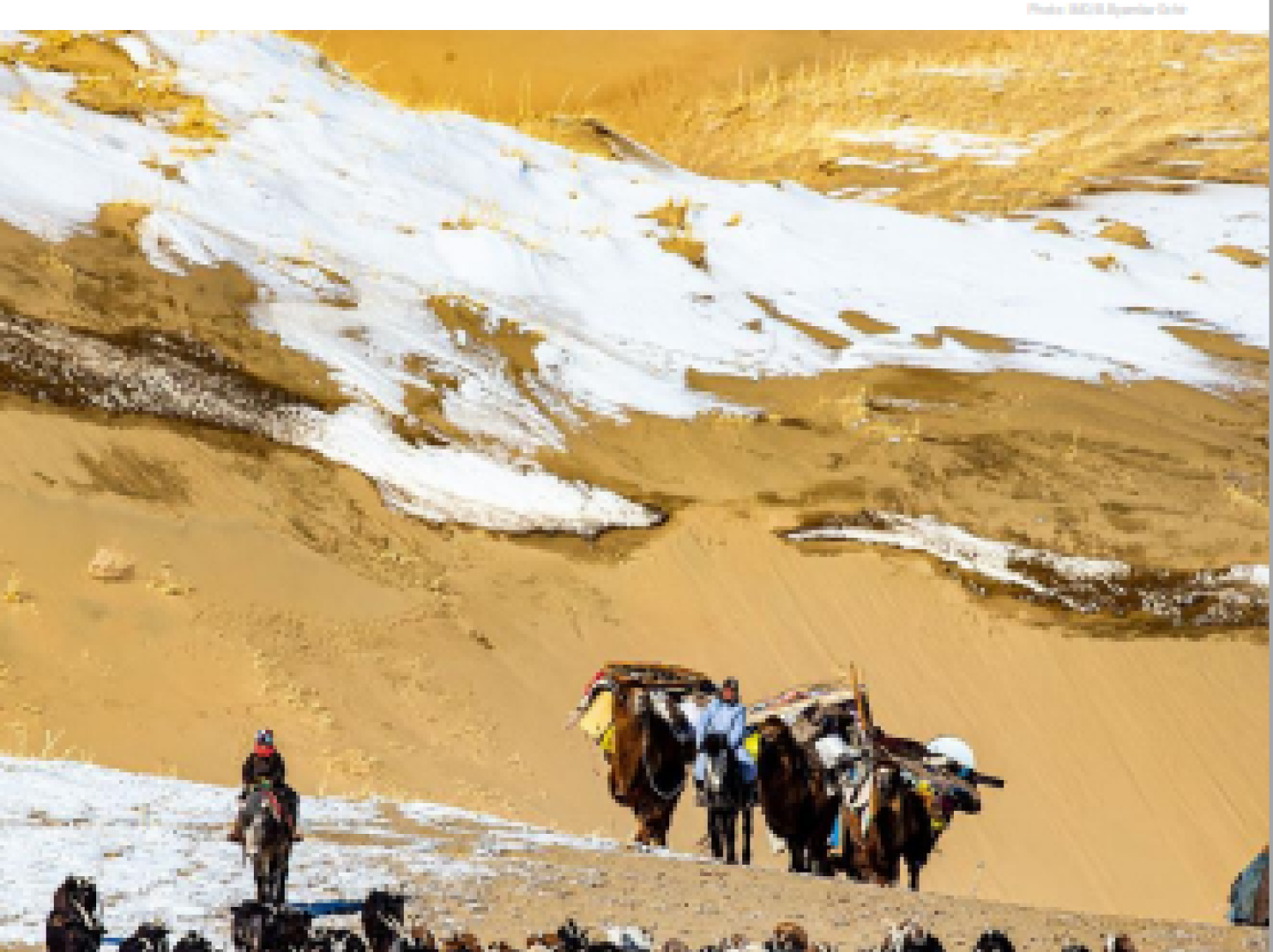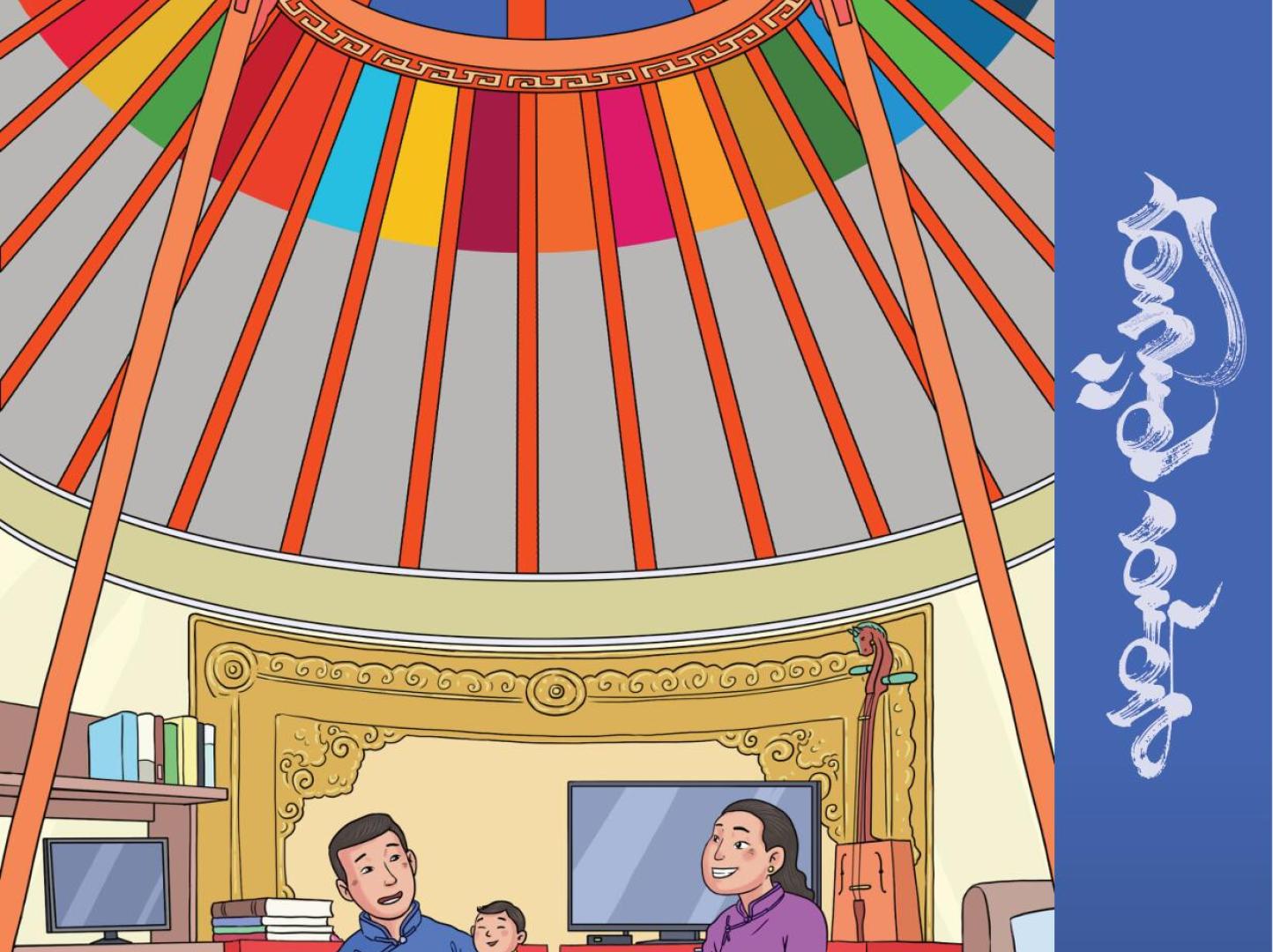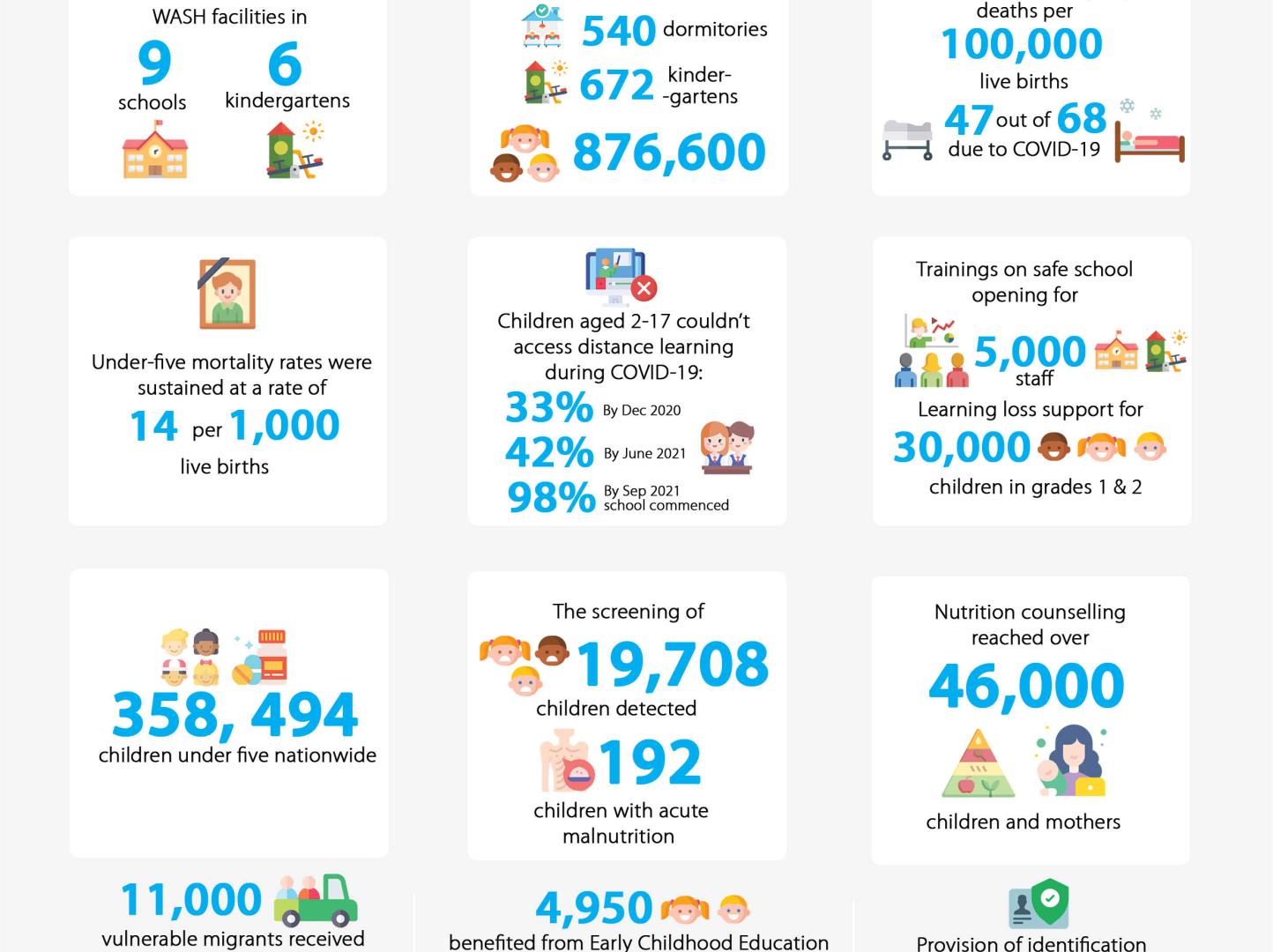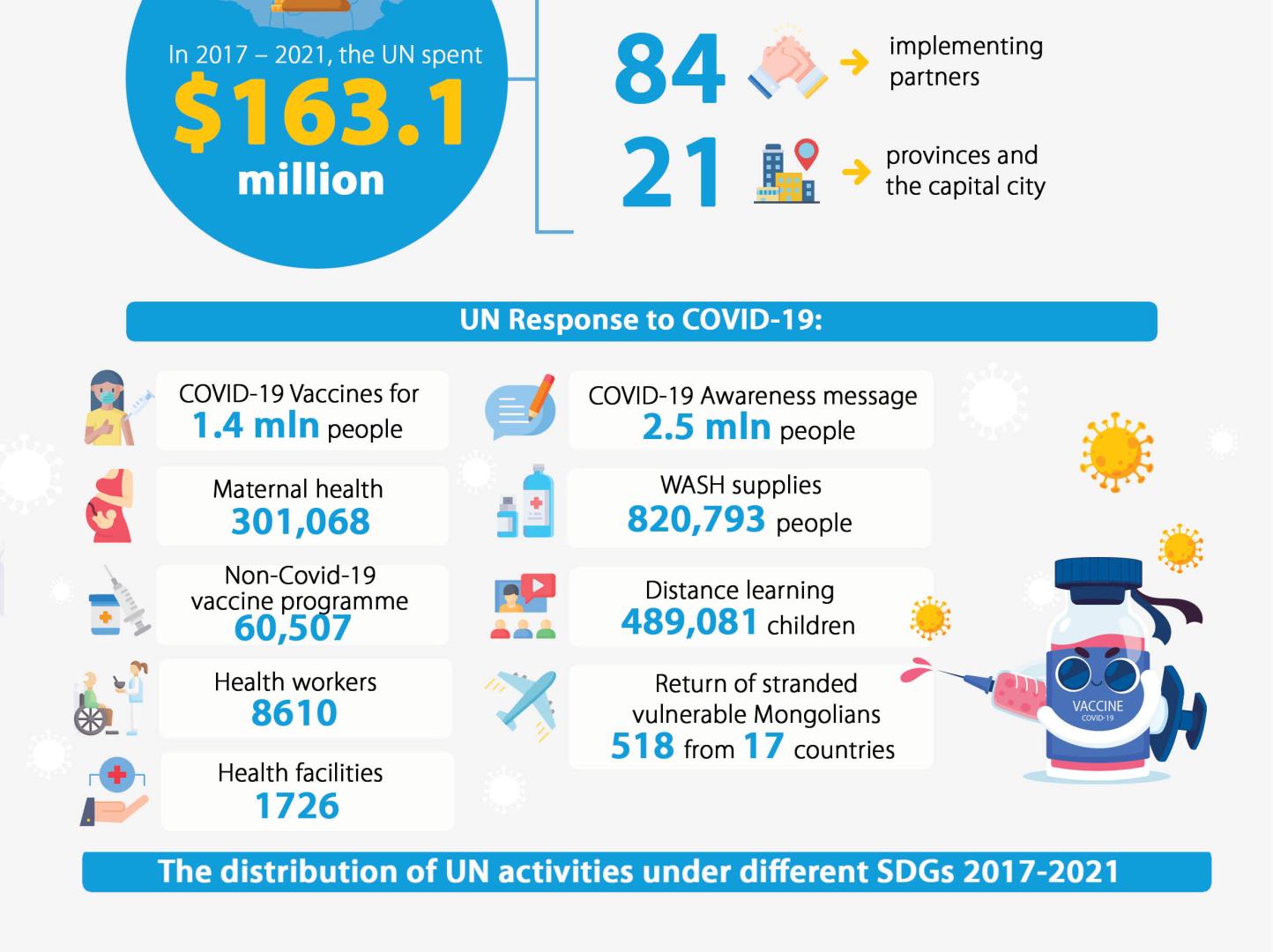Latest
Press Release
28 March 2024
Joint Steering Committee of the Government of Mongolia and the United Nations Convenes to Review UN system development cooperation progress
Learn more
Story
05 March 2024
Celebrating Mongolian Women's Resilience and Leadership
Learn more
Press Release
22 February 2024
Humanitarian Efforts Intensify as Mongolia Grapples with Dzud
Learn more
Latest
The Sustainable Development Goals in Mongolia
The Sustainable Development Goals are a global call to action to end poverty, protect the earth’s environment and climate, and ensure that people everywhere can enjoy peace and prosperity. These are the goals the UN is working on in Mongolia:
Story
07 September 2023
National Forum for Sustainable Development
The Government of Mongolia, in partnership with the UN in Mongolia, brought together more than 220 delegates, representing all groups of society and development partners to finalize Mongolia's National Commitment to accelerate the implementation of the SDGs at the National Forum for Sustainable Development, held on 7 September.
This paves the way for Mongolia to present its national renewed commitment to the SDGs along with 12 accelerators that will push forward the country's efforts to sustainable development at the SDG Summit on 18-19 September in New York.
Keynote presentation by Mr. L.Balchinluvsan, Director-General of the Integrated Policy and Planning Department, the Ministry of Economy and Development:
Download presentation
SDGs are everyone's business. In particular, the private sector plays an enormous role in achieving SDGs as it drives the economy and growth. Thus, this forum provided a stage for the local leading businesses to present their contribution and best practices to the SDGs.
Learn more about the Forum from Montsame - the media partner of the event.
Video Highlights from the Forum
APU Dairy presentation on its contribution to food security and healthy and nutritious food for the population
Khan Bank - national leading bank to sustainable development presents its commitment
Presentation of Golomt Bank - committed to invest for a brighter future of Mongolia
Invescore presents its commitment to SME development
MCS Coca-Cola presents its commitment to SDGs
The UN in Mongolia calls on individuals and communities, and businesses to Unite to Act for SDGs!
1 of 4
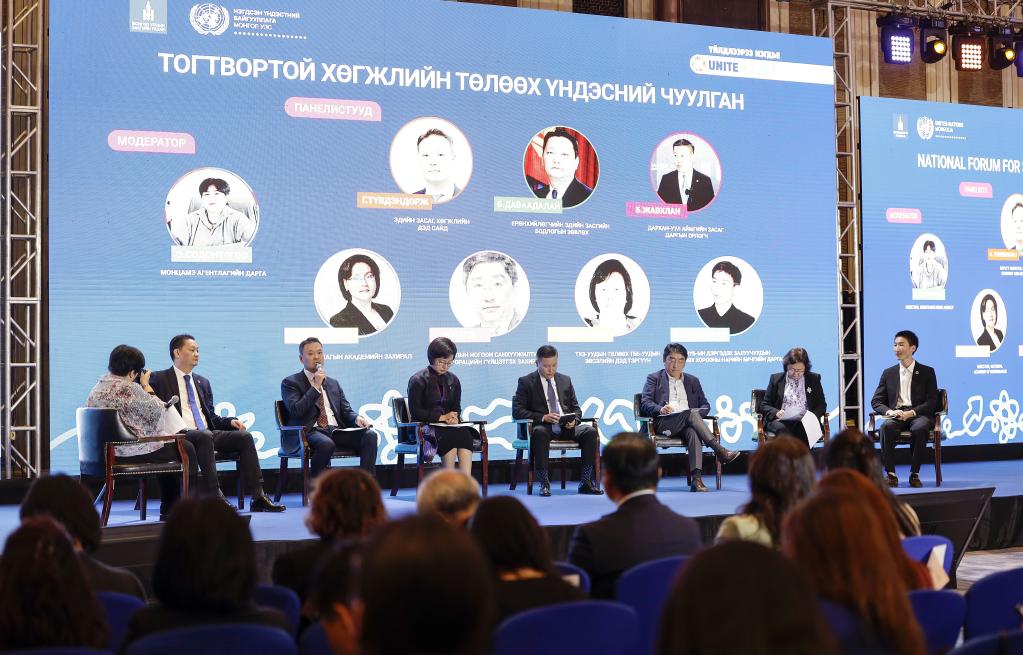
Story
21 June 2023
Narrowing Mongolia’s trade-led development gaps and tapping into its export potential
As a landlocked country, Mongolia faces a multitude of challenges in trade and export. Its export is largely dependent on mineral resources and primarily as raw material. Yet, we see tremendous opportunities to tap into the potential in trade and export with possible value-added processing, leveraging the advancement in digitalization, which will boost economic diversification and reduce reliance on the mineral sector.
After a few years of setbacks from the COVID-19 pandemic, the Mongolian economy has shown a sign of recovery in 2022 despite the impact of the Russia-Ukraine crisis. Trade turnover for 2022 increased 32 per cent from that of 2021, helping Mongolia enjoy 4.8 per cent economic growth in 2022.
However, such recovery comes from regaining trade in a specific sector with a particular trading partner - minerals and China. Over 90 per cent of Mongolia’s export items are minerals, while China counts for more than 80 per cent of Mongolia’s total export. This represents a chronically narrow-based Mongolia’s trade structure, making its economy vulnerable to external shocks.
Furthermore, Mongolia, with its geographical disadvantage of being landlocked, suffers from higher costs and a longer time in transportation and trade logistics, moving its goods across borders. Mongolia, suffering from multi-faceted trade challenges, underperforms in the global market despite its huge trade potential.
According to the UN Global Survey on Digital and Sustainable Trade Facilitation 2021, Mongolia stands far lower than the Asia-Pacific regional as well as global averages in implementation. Mongolia’s trade is the least integrated with the world. While it is a member of WTO, it is a party to merely two regional trade agreements – the Economic Partnership Agreement with Japan and the Asia Pacific Trade Agreement (APTA).
Trade and logistics connectivity of Mongolia is significantly constrained. In World Bank’s latest Logistics Performance Index, Mongolia ranked 97th globally. In UNCTAD’s productive capacities index, capacity of a country to produce goods and services and enable it to grow and develop, Mongolia ranked 94th globally.
International trade has been the backbone of Mongolia’s economic growth. Its trade-to-GDP ratio has stood consistently at over 100 per cent. While domestic market expansion is one way of increasing a country’s economic growth, it is not an easy option for Mongolia, as it is a country with a relatively small population spreading over a huge territory.
Given that Mongolia has a limited domestic market base and tremendous natural resources to supply to the global market, trade-led economic growth is an obvious resort for which Mongolia should strive.
In driving trade-led economic development, Mongolia should take a holistic approach of enhancing its capacity in all four dimensions of trade:
Facilitation of streamlined procedures, which reduces trade costs.
Integration which accelerates Mongolia’s access to the global market, thus supporting its third neighbour policy.
Connectivity links its physical and digital networks to the World for an easier flow of its goods and services. and
Promotion helps Mongolia cultivate the export market, attracting investment and diversifying industries.
By taking such a holistic approach, Mongolia can address the challenges and leverage the untapped potential effectively. In strengthening Mongolia’s capacity in four dimensions, five cross-cutting enablers: policy/governance, human and financial resource, infrastructure, digitalization, and cooperation – should be levelled up to narrow capacity gaps and create a virtuous trade ecosystem.
The clear policy lays a foundation for creating a trade ecosystem while governance ensures its sustainability.
The human and financial resource is an engine for driving the implementation of a trade eco-system and keeping it operational.
Infrastructure, both soft and hard, stands as a backbone to ensure a seamless flow of goods and services.
Digitalization streamlines the way we do business and fosters new digital services and businesses.
Cooperation firms up linkage of Mongolia’s trade ecosystem to those of overseas trading partners for market expansion.
Recognized as one of the means of implementation for the SDGs, trade is directly related to supporting one of three strategic priorities of the United Nations Sustainable Development Cooperation Framework (UNSDCF) Mongolia for 2023 – 2027- green, inclusive, and sustainable growth. As a joint strategic planning framework for collaboration between the United Nations and the Government of Mongolia, the UNSDCF is aligned with the national sustainable development priorities of Mongolia, set in both the New Recovery Policy, a mid-term policy, and Mongolia’s Vision-2050, a long-term development policy.
Trade is an important instrument for realizing two of the New Recovery Policy, recovery of operations of border ports and industrial recovery, as well as goal 4 of Vision 2050 – becoming a nation with sustainable economic growth.
The United Nations in Mongolia is committed to supporting the Government of Mongolia in narrowing trade development gaps and shaping up its trade ecosystem for sustainable development – an effort to continuously improve trade efficiency while diversifying its export markets and products.
In 2023, the United Nations in Mongolia has already embarked on a series of serious efforts on this front. The Global Digital Dialogue 2023 with a focus on trade and e-Commerce was organized in connection with the launch of the eT Ready report for improving Mongolia’s overall e-Commerce environment and the ICT Expo 2023: Mindgolia for accelerating Mongolia’s transition from mine-centric to mind-driven economy. The World Export Development Forum (WEDF) 2023 will be organized in the last week of June to help cultivate the unrealized export potential. All of them are being done in close partnership with UN agencies with proven professional expertise and experience in Trade, such as the United Nations Conference on Trade and Development (UNCTAD) and International Trade Centre (ITC), as well as with the leadership of the Government of Mongolia.
The United Nations in Mongolia will stand as a strong partner in Mongolia’s trade development journey, in close coordination and cooperation with all relevant stakeholders and key players, including related United Nations agencies and other Development Partners.
1 of 4
Story
18 April 2023
Humanitarian Country Team in Mongolia helped herders affected by dzud
Together with Deputy Prime Minister S. Amarsaikhan, Mr. Mishra visited herders in Ugiinuur and Tuvshruulekh soum, Arkhangai aimag to be acquainted with the devastating impact of the dzud that occurred in the last winter and continued through this spring.
Humanitarian Country Team (HCT), consisting of international organizations, has mobilized humanitarian assistance under the leadership of the UN Resident Coordinator, and provided cash and in-kind support to more than 15,000 affected herder households in 240 soums of 21 provinces.
The loss of animals was expected to exceed 2 million, however, partly thanks to the early action and response by the joint efforts by the Government of Mongolia and the HCT, the loss has been contained so far to 1 million, according to NEMA officials.
Although herders tried their best to prepare for hardships in winter, they weren't able to save hay and fodder for their livestock due to drought in the summer that caused pasture degradation and increasing commodity prices. Many herders suffered heavy loss of animals during the winter and spring.
For instance, Mr Kh.Tumurbaatar, herder from Doit bagh (village) of Ugiinuur soum lost around 50 of his 200 animals. Mr A.Myagmar owned more than 1000 animals. But as of now, he lost around 70 per cent of his total livestock.
"It's heartbreaking to see the loss of livestock that brought enormous threats to the livelihoods of herders who suffered from the continued dzuds over the winter and spring", said Tapan Mishra.
"We must focus our efforts on prevention and preparedness rather than a response to disasters" added Tapan Mishra.
He further emphasized the importance of joint and coordinated efforts and policy support to build the resilience of herders to the natural shocks through comprehensive measures, including improving the quality of herds, value-added products development of the raw materials, and green fodder and feed production that would yield higher productivity of the animal husbandry.
1 of 4
Publication
14 July 2022
United Nations Sustainable Development Cooperation Framework (2023-2027) Mongolia
The United Nations Sustainable Development Cooperation Framework (UNSDCF 2023-2027) represents the joint strategic planning framework for collaboration between the United Nations and the Government of Mongolia in the next five years.
The UNSDCF represents the UN development system’s collective offer to support countries in addressing key nationalized SDG priorities and gaps.
By mutually committing to the UNSDCF for Mongolia 2023-2027, the Government of Mongolia and the UN agreed to work together for Mongolia to advance in sustainable development as a prosperous country characterized by an inclusive, resilient, healthy, and safe environment, and a cohesive society based on the rule of law and human rights.
1 of 4
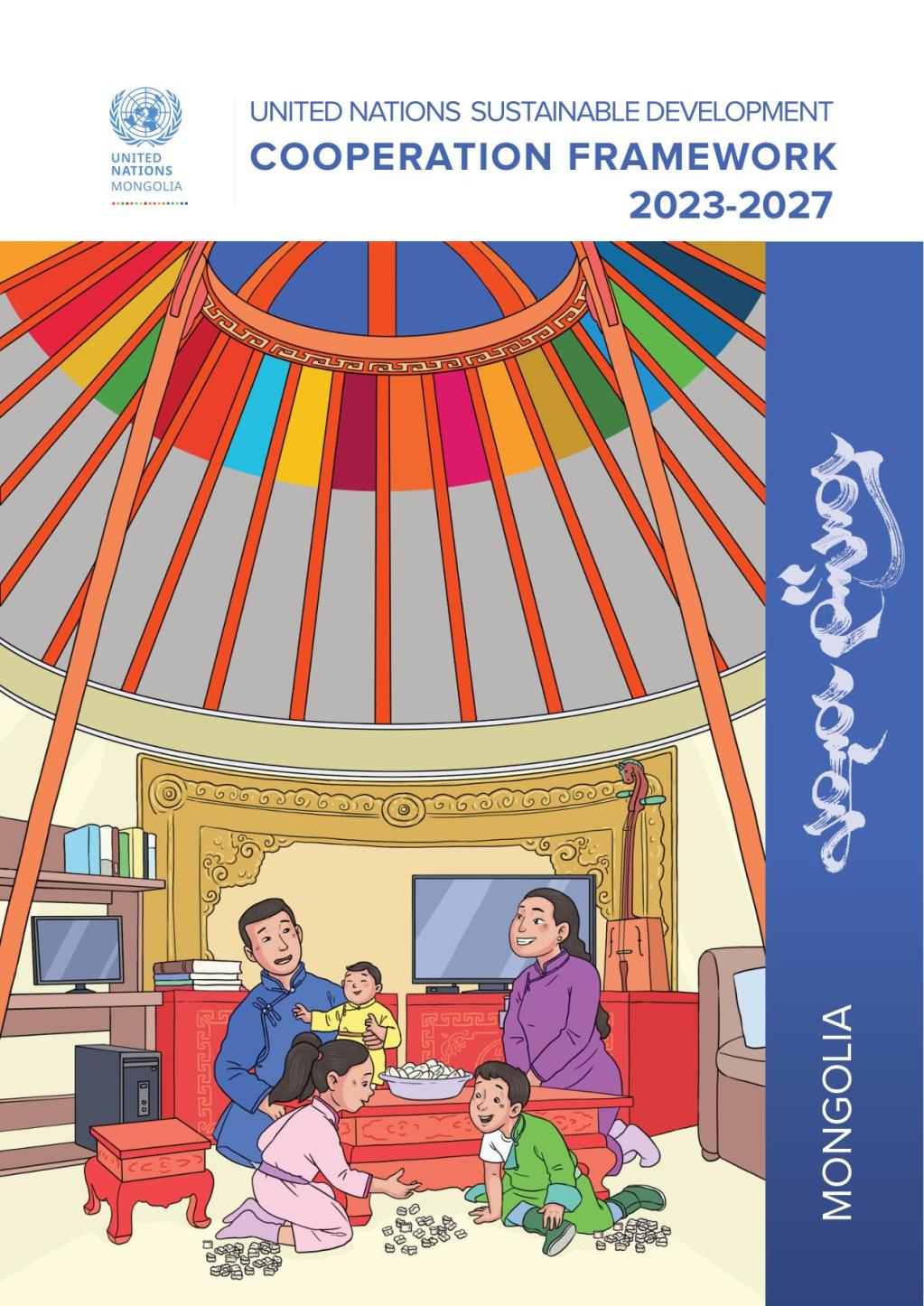
Story
05 March 2024
Celebrating Mongolian Women's Resilience and Leadership
On the occasion of International Women’s Day 2024, the UN Mongolia shines a spotlight on some outstanding women and girls who have demonstrated resilience, dedication, and leadership in Mongolia. The UN Mongolia is proud to stand with them as they embark on the journey to overcome the hurdles ahead and strive for a better future, not only for themselves but also for the communities and societies they are a part of.Breaking the vicious cycle of gender-based violence Meet Ms. Bolor (her name has been changed for her safety), who bravely escaped with her three children, aged 2 to 12 years old, from her abusive husband. She found much-needed refuge in a haven where she was welcomed with the reassuring words, "You are safe here." At the one-stop-service center, Bolor and her children received not only warm shelter, food, and clothes but also psychological support as she coped with the physical and mental traumas from her abusive marriage.Bolor is one of thousands of women who not only find shelter but also receive assistance to break the cycle of violence at One Stop Service Centers/shelters. Here, in addition to ensuring their safety, the government offers seven types of services, including primary health care, social and psychological counseling, and legal services.Thanks to the eleven One-Stop-Service Centers established between 2016 and 2023 within the project "Combatting Gender-based Violence in Mongolia," implemented by UNFPA in cooperation with the Ministry of Labor and Social Protection and with the support of the Swiss Agency for Development and Cooperation, survivors of gender-based violence receive protection and safety and find the courage to rebuild their lives. More than 90% of women visiting the One Stop Service Centers/shelters come with their children, and as of 2023, 3037 out of the total 4037 service receivers from the Centers were minors. UNFPA Mongolia continues to provide professional training and necessary support to the One Stop Service Centers/shelters’ staff in gender-based violence prevention, protection, and GBV risk mitigation.Empowering women with entrepreneurship skills Meet Ms. Nomin, a pig farmer and mother of five who recently migrated from Tuv province to Nalaikh district in Ulaanbaatar. Rebuilding her life in a new land alongside her husband and children was no easy task. They purchased a small plot of land, where they built their house and a pigsty, embarking on a journey they never imagined they would undertake.The idea of starting a pig farm dawned on Nomin during the COVID-19 pandemic. Amid the prolonged lockdown in Mongolia, the government provided each citizen with 300,000 MNT to mitigate the pandemic's impact. With this assistance, Nomin's family purchased four piglets and a young hog in 2021. Today, they care for 50 pigs.Nomin continually sought to improve her pig genetics with high-quality breeds, aspiring to modernize her farm into a commercial enterprise. Expanding pigsties, enhancing water supply, planting vegetables, and installing fencing signify her commitment to advanced farming practices.Despite her efforts, Nomin was yet to become the entrepreneur she envisioned. In March 2023, she joined a “Shudarga Dens” Tuv NGO project supported by IOM Mongolia, which aimed to assist migrant women's businesses. Through entrepreneurship training, she qualified as a top participant, earning a grant. With this support, she acquired essential equipment like a meat saw and vacuum packing machine, expanding her business.Equipped with new tools, Nomin has transformed her pigsty into a successful business, boosting her family's income. She aims to expand her pig population, produce meat products, and increase sales. Benefiting from IOM Mongolia's project, she now processes and vacuum-packs meat, enhancing their income and meeting the demand for quality meat in urban and rural areas.Investing in women herders and developing a niche camel-milk value chain P. Munkhdul is a dedicated camel herder living in the Dundgobi region. She and her family tend to a herd of 400 camels. Embracing innovation and community support, Munkhdul became a member of the first camel herders’ cooperative established through the SDG-BE project, funded by EU and implemented by FAO, ILO and UNDP. FAO aims to develop the camel-milk value chain and uplift local camel herders by connecting them with the private sector. Munkhdul contributes her valuable camel milk to this chain, enhancing the local economy and sustainability.Munkhdul's journey into camel husbandry began in her youth. Initially, she perceived camel milking as a daunting task that demanded considerable physical strength and dexterity. However, years of experience have honed her skills to perfection. Her efforts culminated last year when she supplied an impressive 20 tons of camel milk, earning national recognition for her achievement. "It feels great to be acknowledged for my work. In addition to milking, I also produce over ten different dairy products from camel milk so that my family can enjoy this healthy food," Munkhdul shares. Acknowledged for its nutritional benefits, camel milk has been the focus of various studies, underscoring its importance to both health and heritage.Bridging the digital divide - reaching remote areas with digital skills “I will be a software engineer!” says Bujmaa, a 15-year-old girl from Khankh soum, Khuvsgul province – a small community over 1000 km away from the capital city. “Even though I am a girl, I have big dreams to write codes and create software and applications”.A Bujmaa is one of the few girls in the ICT club established for the first time with UNICEF support at secondary schools in Mongolia to enhance students’ extracurricular activities. During the pandemic, many children across Mongolia especially those from remote areas like Khankh were unable to access distance learning due to a lack of access to technologies and/or the ability to beneficially use those for extracting information and facilitating knowledge.To support children with their digital skills and provide equal education to all, UNICEF partnered with the leading mobile operator Mobicom on the “Smart Education” initiative. The company helped establish digital classrooms with better internet connection in eight schools across Mongolia. UNICEF brings, through the School for Asia initiative, trainings on digital literacy skills, hybrid teaching methodologies and the use of technological devices and development of digital contents for teachers and children from secondary schools in these classes. Mongolia considers digital transformation as a critical means to accelerate progress towards Sustainable Development Goal (SDG) 4 and sees UNICEF as one of the strategic partners in this area. Redefining Leadership: Beyond Gender Stereotypes Meet three women, B. Battsetseg, B. Tserenlkham and B. Oyunbileg, who dare to challenge gender stereotypes and champion their peers in leadership. In Mongolia, grassroots initiatives are actively working to challenge age-old patriarchal values and norms that perpetuate gender-based stereotypes mainly focused on the capital city. One of such initiatives responding to this need is Women’s Leadership Network of Mongolia (the Network), a nationwide grassroots movement with almost 2,000 members supporting each other across political affiliation, initiated under UNDP’s project funded by the Korea International Cooperation Agency.Joining the network, more and more women are believing in themselves, dismantling the gender stereotypes imposed by men on women, says B. Battsetseg. “We encourage a shift in the attitudes of women themselves.”“Through the Network, I am gaining confidence as a leader along with change in my perceptions towards politics,” says B. Tserenlkham. B. Oyunbileg wants more women to support and encourage one another when they decide to pursue a leadership role instead of casting doubts about their abilities or concerns about family and reputation.The Network is among a number of initiatives being implemented with support from the project. The project also provided substantial support to Mongolia in adopting a 30 percent gender quota in the 2024 elections, followed by a 40 percent quota in 2028 in its Election Law from 20 percent. This legislative change opened doors to many special measures such as zipper list, waivers of nomination fees effective changes in promoting women’s political participation.
1 of 5
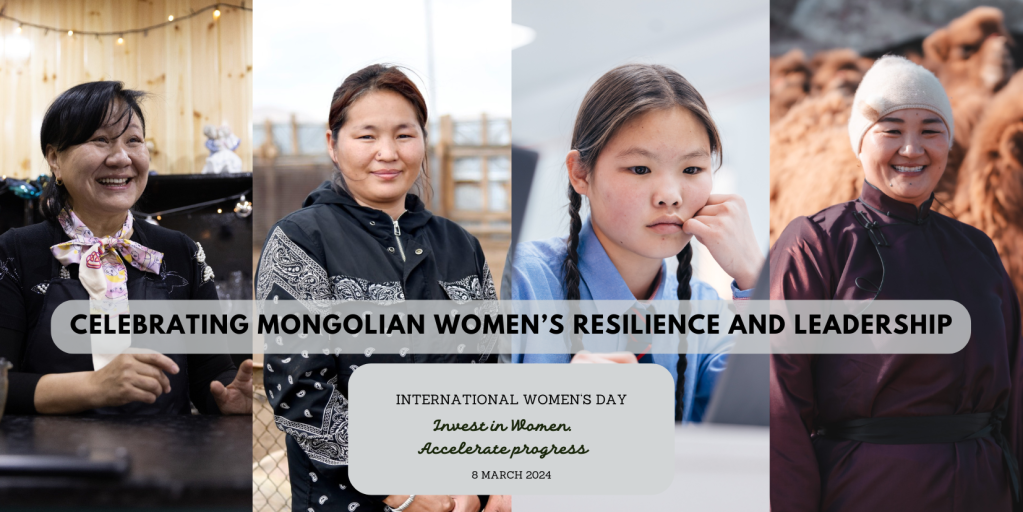
Story
10 February 2024
Meet Ms.STEM Anu-Ujin and her friends, aspiring girls in STEM
On the occasion of the UN International Day of Girls in Science, we are spotlighting a pioneering girl in science from the city of Ulaanbaatar, Mongolia. Ms. A. Anu-Ujin, 18, is a beacon of aspiration for her peers to excel in STEM (Science, Technology, Engineering, and Mathematics).
A. Anu-Ujin approached the UN Resident Coordinator with her ambitious “Ms. STEM” project proposal, aimed at promoting girls' education in STEM—an uncommon initiative for someone her age. Her proposal was welcomed by the Resident Coordinator, Mr. Tapan Mishra, who supported her in realizing her dream by garnering generous support from the NewCom group—a national player in renewable energy.
Over 40 aspiring students from various high schools in Ulaanbaatar, including some girls in their gap year, joined the initiative to harness their creativity to design innovative solutions for some of the pressing climate-related challenges.
The project invited leading young female experts in the STEM field to deliver 4-week-long specialized training. These brilliant young women learned various subjects, from mechanical engineering and nano-science to gender equality and female leadership, and engaged in creativity-building activities such as field visits to recycling facilities by a national company and climate activism initiatives to broaden their horizons.
The UNYAP (UN Youth Advisory Panel) team, a dedicated group of young champions who serve as a voice and a bridge for the UN in Mongolia on youth development and well-being, provided mentorship to the girls to realize their ideas.
The highlight of the project was the Ms. STEM Science Fair, hosted on November 4, 2023, at the UN House Mongolia, showcasing innovative projects aligned with the Sustainable Development Goals (SDGs) and emphasizing the program's dedication to real-world impact.
Girls demonstrated innovative and efficient ways to save energy, purify water utilizing potatoes and activated carbon or solar and wind energy, create compost from food waste, develop a wind-powered power bank for electric cars, and construct eco-friendly homes.
Through this bold initiative, A. Anu-Ujin has become a role model for young women everywhere, proving that age is no barrier to making a difference. Her dedication to environmental stewardship underscores her belief in the power of STEM to create positive change in the world, paving the way for a future where all young women can thrive and succeed in STEM.
1 of 5
Story
15 May 2023
Mongolian peacekeepers support refugees return home in South Sudan from war-torn Sudan
UNITY - South Sudanese refugees, who initially sought shelter from conflict in 2013 by fleeing to their northern neighbour, Sudan, are now heading back to their home country, given escalating violence in Sudan's capital, Khartoum.
These twice-displaced individuals urgently require humanitarian assistance and on 5 May 2023, a team of military, police, and civilian peacekeepers from the United Nations Mission in South Sudan (UNMISS), visited the South Sudan-Sudan border area, Panakuach, to assess their situation.
The team coordinated with Mongolian peacekeepers during their visit and spoke with the South Sudanese border police area commander and humanitarian workers.
According to South Sudan's Relief and Rehabilitation Commission (RRC), as of 4 May, some 1,198 returnees were recorded.
“We are doing everything we can to secure the populations returning from Sudan. In collaboration with officials from Rubkona county, we have allocated some land for them to temporarily settle, but they lack food and water. They need more assistance,” said David Lung Tuorek, an official from the RRC.
Rot Riak, a nearby town housing people displaced by climate change—their villages were destroyed by three consecutive years of flooding in Unity state—was identified as a host community for many recent returnees.
UNMISS met with community leaders and government officials in the town, who reported the arrival of approximately 292 returnees.
Walking around the area, the UNMISS patrol team noted shelter, food, and access to clean drinking water were pressing needs.
Despite their own meagre resources, the host community is lending a hand to these newcomers,
"All of us gathering here came from different areas in Khartoum, where the fighting was happening. Most of us fled war in South Sudan many years ago. We returned here in Rot Riak on May 27, and are overjoyed to be safe but we need more help. There is no food or clean drinking water. Host communities have been helping us with a small amount of money. We used it to buy a fish that all of us [292 returnees] shared," said Nyayian Gatdet.
"We can work, we can support ourselves if we get help, but you can’t do anything if your stomach is empty. With food and water, we can manage to support our families," Nhial Yaat, another returnee, added. "There are no plastic sheets, food, or water. We need humanitarian support; if they give us some plastic sheets, we can build temporary shelters."
The International Organization for Migration (IOM) has been doing its part, receiving people coming in from Sudan, registering them and facilitating their transportation from Panakuach to Rot Riak, as well as liaising with partners to help boost the overall humanitarian response to this crisis.
"Many of the newly returned aren't sure if their original homes still exist, due to the excessive flooding in past years," reveals Miriam Mutalu, Head of the IOM sub-office in Bentiu. "However, many new arrivals in Rot Riak are tracking down their families, finding relatives either in nearby villages or the camp for internally displaced persons."
For Captain Munkhbyar Ganileg, patrol leader of the Mongolian peacekeepers, protecting these new returnees is key, but more needs to be done.
"The government and UNMISS peacekeepers are keeping the area secure, but many will need humanitarian assistance. Right now, these are women and children who have come here by foot, and more returnees will cross the border in the coming weeks and months. We will do everything in our power to support them."
The information gathered during the UNMISS visit will be used to coordinate a multidisciplinary response to the situation, in partnership with relevant authorities and humanitarians, by addressing urgent needs of both returnees and the host community.
Please check the Flickr for more photos: South Sudanese return amid Khartoum unrest, seek aid as UNMISS provides a protective presence | Flickr
This story was written by Peter Bateman and was originally published on unmiss.unmissions.org.
1 of 5
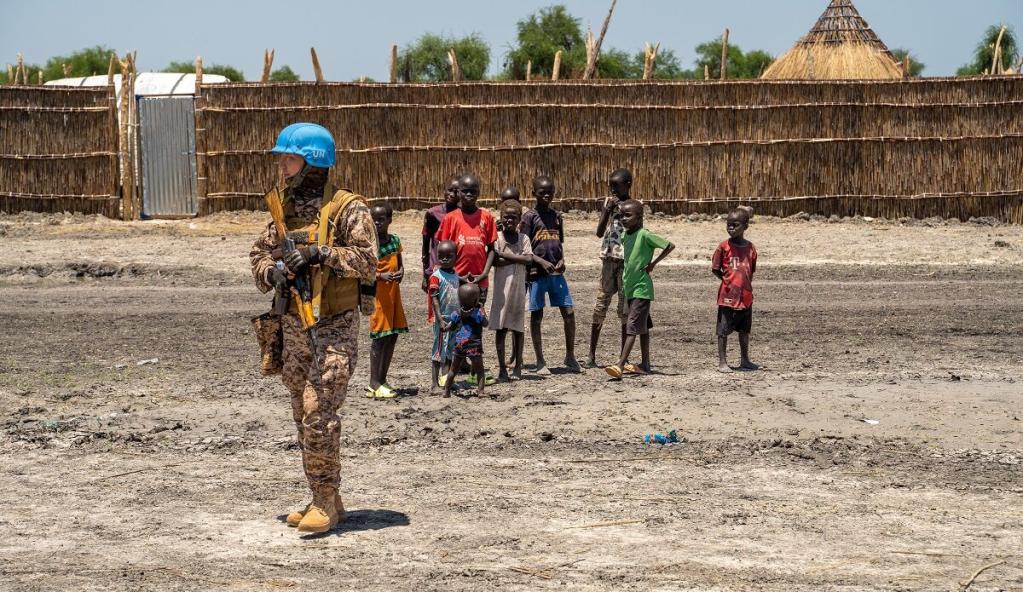
Story
31 March 2023
The UN Resident Coordinator’s commitment to advancing Mongolia’s SDG actions
Since taking office in 2019, with his convening power as a Resident Coordinator for the UN System in Mongolia, Mr. Tapan Mishra has strongly advocated for making the achievement of the Sustainable Development Goals (SDGs) a national priority. He has engaged with the highest levels of the Mongolian government, including the President, the Prime Minister and his cabinet, Parliament Members, and the public.
Bringing the all-UN County Team onboard to offer collective UN support to Mongolia’s development, the Resident Coordinator has positioned the UN as a strategic partner to the Mongolian government on its path to the sustainable, green, and inclusive development envisioned in the SDGs and Vision 2050–Mongolia’s long-term development policy–based on Agenda 2030.
Committed to bringing the SDGs to the top of the national development agenda, the Parliament of Mongolia partnered with the UN in Mongolia to organize the first-ever High-level National Forum on the SDGs in October 2021. This was a groundbreaking forum on integrating and implementing the SDGs into national policies and programs in Mongolia.
Mongolia’s authorities have acted upon the nation’s promise, evidenced by its commitment to creating a ministry with a portfolio to deal with development priorities, the Ministry of Economic Development, which now spearheads the national development agenda envisioned in Agenda 2030 and Vision 2050.
Furthermore, Mongolia consolidated its commitment to the SDGs by establishing the Multistakeholder Council for Sustainable Development (MCSD), chaired by Parliament’s Sustainable Development Sub-committee, and reinstating the National Committee for Sustainable Development (NCSD), chaired by the Prime Minister of Mongolia.
On such fertile ground, the UN Country Team has entered into a new phase of its partnership with Mongolia, co-signing the UN Sustainable Development Cooperation Framework (UNSDCF) with the Government of Mongolia—the blueprint for the UN’s collective support to Mongolia from 2023 to 2027.
Leveraging his convening and facilitating role, the UN Resident Coordinator in Mongolia brought 23 UN agencies, funds, and programs on board for the new UNSDCF, up from 17 in the previous UNDAF (UN Development Assistance Framework). The UNSDCF is designed to advance sustainable development in Mongolia as a prosperous country characterized by an inclusive, resilient, healthy, and safe environment and a cohesive society based on the rule of law and human rights.
Sustainable, inclusive, and green development is not only the agenda of the government and the United Nations but Mongolia’s communities—including the private sector and civil society—that have embraced the SDGs as guidance for a better future.
This was well demonstrated in the first-ever large-scale outdoor public event to promote local SDG initiatives and best practices, and to mobilize more collective action towards the SDGs in Mongolia, held in September 2022.
More than 150 partner organizations, ranging from government entities to leading national companies and civic movements, showcased their work towards the SDGs. At least 5,000 people roamed the city’s central square, going from booth to booth. SDG Open Day provided an excellent opportunity to see where Mongolia is and what needs to be done to inspire and further mobilize united and individual actions to achieve its development goals.
Mongolia’s efforts to accelerate the implementation of the SDGs are focused on localizing SDGs and the adoption of nationalized targets and indicators. For example, some provinces (Darkhan-Uul and Orkhon) have already taken up the challenge and championed the localization of the SDGs into their regional development plans and push for a climate-focused agenda.
The coordinating and convening role of the UN Resident Coordinator, along with the committed and empowered UN Country Team, has become more evident in the national ownership of SDGs, bringing all parties together with a commitment to creating a sustainable future for Mongolia.
Tapan Mishra, the UN Resident Coordinator in Mongolia, truly believes in the prosperous future ahead for Mongolia if development challenges are effectively addressed with the strong commitment of all stakeholders.
“Having a clear blue sky and sunlight for over 260 days a year, and with its vast and deep resources, both natural and human, Mongolia has great potential to develop as a regional role model for sustainable and green development and achievement of the SDGs, driven by human-rights and gender-equality principles to ensure inclusive and equitable prosperity for all,” said Tapan Mishra.
1 of 5
Story
12 January 2023
Enhancing social protection and disaster response in rural Mongolia
20th February 2020 in Tosontsengel soum, Zavkhan Province. The temperature is -30°C, and the air is fiercely cold at the herders’ camp in the snow-covered hilly countryside. The deep snow made it difficult to continue our journey in 4-Wheel Drive vehicles, requiring us to walk uphill to reach our final destination – the mountainside winter camp of a group of herding families.
This was my first experience with Mongolia’s cold, harsh winter after arriving in Mongolia as UN Resident Coordinator. The joint UN team, including UNICEF, UNFPA, ILO, and FAO, was on a mission to launch the first-ever joint UN program funded by the Joint SDG Fund in western Mongolia’s Zavkhan Province.
Mongolia, a vast, sparsely populated, landlocked country, is prone to multiple natural disasters and shocks induced by climate change. At the time of our site visit, Mongolia’s western region was experiencing dzud – a natural disaster of extremely harsh and icy winter conditions due to a dry summer, which causes livestock to die in vast numbers due to the cold and a lack of pasture feed and green fodder. We were also assessing the preparedness for the COVID-19 pandemic.
The timing couldn’t have been better for the launch of the UN’s Joint Programme (UNJP) on Social Protection to reduce the vulnerability of Mongolia’s herders, who make up one-third of the country’s population, to natural disasters and other shocks through comprehensive social protection measures.
A semi-nomadic lifestyle, constantly moving in search of better pastureland for their herds, makes Mongolian herders and their families most vulnerable to poverty, pushing them to further margins. They also face many challenges in accessing basic social services due to the nature of their lifestyle.
Extending social insurance coverage to herders
Social protection is a means to reduce the negative impact of any shocks induced by natural calamities. Our joint programme determined that enrolling herders in social insurance is an effective approach to extending their social protection. We found that less than 20 percent of herders enrolled in social insurance schemes, and only 40 percent had health insurance.
In our efforts to reverse the reluctance of herders to enrol in social insurance, we had to find innovative and non-traditional approaches while building on existing institutional frameworks and resources for a quick win. More creative incentives and flexible ways to pay the premium were highly encouraged among herder cooperatives.
Non-traditional partners such as the National Center for Lifelong Education (NCLE), cooperatives and pastureland user groups, trade unions, employer organizations, and social insurance offices were invited to partner with us in advocating for the benefits of the social insurance program. Herders who had benefited from social insurance were also good advocates.
With the approval of the amended Labour Law in 2021, the UNJP further promoted key principles of labour rights, including freedom of association and collective bargaining. The project supported the trade union in expanding its membership to assistant herders, which was elevated to a nationwide campaign with support from ILO.
Enhancing shock responsiveness
One of the gaps identified in Mongolia’s social protection system is shock responsiveness. When a shock hits, assistance should be immediately available to those who are hit hard and the most vulnerable. Children are among the first to be hit hard and need the most support.
Negative impacts on children can include mortality and injury from extreme weather events, as well as disruptions in school attendance, heightened risk of food insecurity, and malnutrition due to declining livelihoods.
Our team visited Munkhjargal’s family, with four children aged between 1-15 years old, living in the most challenging and coldest area of Zavkhan Province. They raised their animals in a remote mountainous area and earned seasonal income mostly from their livestock.
Many rural children who were at risk due to dzud benefited from the financial support. The families said the cash assistance was timely and useful, enabling them to take early action for their children to prevent further suffering.
Seeing the direct benefit of such interventions to reduce vulnerability, the Government of Mongolia scaled up the programme to all children in Mongolia up to 18 years of age as of December 2022.
During the COVID-19 pandemic, many people struggled through prolonged lockdowns, and Children’s Money was a means for many to survive hardships.
Using existing systems, the cash grant pilot went smoothly without causing additional burdens for the national and local social welfare systems. As the cash grant was not subject to any bank fees and not used to pay for household loans or interest payments, piloting the programme through the existing system was the least costly administrative solution for directly reaching beneficiaries and meeting their needs.
Therefore, it is ground-breaking in terms of taking early and timely action to protect the well-being of children from extreme weather events, which are increasing because of climate change.
Further benefits of shock-responsive social protection measures
It was my utmost pleasure to witness some of the impactful results at the event held toward the close of the project when I visited Zavkhan again in April 2022.
Ultimately, the project sought to increase herders’ resilience to shocks and vulnerability through sustainable interventions that will make them more independent in the long run. FAO supported Herders for enhancing resilience through the Resilience Index Measurement and Analysis (RIMA) tool One of these interventions was supporting their entrepreneurial skills and helping them set up start-ups led by UNFPA
Otgondemberel, a herder from Ikh-Uul, Zavkhan Province, presented some of his work to the UN Secretary-General when he visited Mongolia in August 2022. Thanks to support from the UN’s joint programme, he started a small project to process sheepskin and hides for animal husbandry products. He was able to earn extra income that helped him to purchase social insurance for himself and his family.
Looking back at the work completed by the project, 14 start-ups have already stood up on their feet, contributing to the betterment of the livelihood of herders. These start-ups benefited from the project’s business incubation service, including financial and marketing training for improved entrepreneurship skills.
While assisting herders with their hard skills, we needed to address their physical and social health by offering them life-skill training. Building their soft skills, like better communication, avoiding substance abuse, managing stress, awareness raising on sexual and reproductive health and reproductive rights, and the prevention of gender-based violence, was an essential part of a holistic approach.
Through these practical approaches orchestrated by UN Mongolia, social and health insurance coverage increased by five per cent among herders at the national level, according to the General Authority for Social Insurance. In the five target soums in Zavkhan Province, the program saw a 10 percent increase in coverage.
Moreover, thanks to the SDG Joint Fund, the four UN agencies in Mongolia joined forces and pooled funds for greater coherence and stronger impact to make a difference in delivering a development program that aimed to improve the resilience of herders – one of the vulnerable groups at risk to be left behind. Each agency brought its best and unique assets to the successful implementation of the program. This proved that through a unified and collective offer, the UN system can fulfill the promise to bring about substantial positive change in its partner country.
1 of 5
Press Release
28 March 2024
Joint Steering Committee of the Government of Mongolia and the United Nations Convenes to Review UN system development cooperation progress
The purpose of this meeting is to review the progress of the UN interventions in Mongolia within the UNSDCF to contribute to sustainable, green, and inclusive development. Currently, 23 UN agencies are signatories to the UNSDCF and are committed to contributing to the following strategic priorities:Human development and well-beingGreen, Inclusive, and Sustainable GrowthPeople-centered Governance, Rule of Law, and Human RightsAt the JSC meeting, the UN presented its Annual Results Report of the implementation of the Cooperation Framework, highlighting the significant progress made in 2023 towards achieving the goals mentioned above. In 2023, the UN system in Mongolia implemented 158 programs and projects, totaling USD 51.4 million. Notable achievements include improvements in the quality of life for 250,000 elderly individuals, advancements in drinking water sanitation facilities for over 71,000 people, and significant increases in camel milk product exports and private sector investments. More than 92,000 urban residents in ger districts benefited from improved flood-resilient sanitation facilities and the building of flood protection dams. Additionally, our efforts led to the rehabilitation of 49,000 hectares of degraded rangelands and the adoption of improved pasture management practices in 82,000 hectares. Furthermore, the UN’s policy support played a pivotal role in the adoption of the new election law enabling a 30% gender quota for the 2024 elections.The JSC members were also introduced to the priorities of the UN work in the coming years. The UN agencies are joining their resources and efforts to make the development efforts more impactful and achieve greater system-wide coherence that supports national priorities and needs.In 2023, Mongolia pledged its renewed commitment to accelerate SDGs at the SDG Summit held in September 2023 in New York, based on its Second Voluntary National Review that was elaborated in wide national consultation. In his closing remarks, Mr. Tapan Mishra, UN Resident Coordinator, emphasized that the UN in Mongolia stands ready to support Mongolia to achieve sustainable and equitable development, leaving no one behind.Representatives of the diplomatic community and development partners were invited as observers to this Joint Steering Committee meeting.
1 of 5
Press Release
22 February 2024
Humanitarian Efforts Intensify as Mongolia Grapples with Dzud
Mongolian authorities requested the Humanitarian Country Team, consisting of UN agencies, and international and national humanitarian organizations in the country, to support the country’s efforts in better preparedness, anticipatory actions and response to address the forthcoming crisis.Led by Tapan Mishra, UN Resident Coordinator, the HCT has intensified its coordinated efforts to provide vital support to affected herders, in close collaboration with the State Emergency Commission and other government agencies. The Government’s request underscored the urgent needs of herder households for essential necessities such as food, medical supplies, firewood, coal, and cash assistance. Responding to the call, the HCT released the Dzud Early Action and Response Plan for 2023/2024 which identifies over 150,000 people in dire need of support, with 33,000 individuals classified as the most vulnerable. The HCT's assistance includes life-saving aid in the form of cash assistance, medical supplies, dignity and hygiene kits, hay and fodder, fuel, and psychological support.“I am particularly concerned that of these, around 33,400 are women, men, girls, and boys who need urgent humanitarian support and ensure their continuity of access to critical services,” said Tapan Mishra. Despite significant efforts, the road ahead remains challenging, necessitating continued commitment and cooperation from all stakeholders. With USD 1.8 million already raised to assist herder households, further support is urgently needed. To mobilize the necessary resources, the HCT, through the United Nations Office for the Coordination of Humanitarian Affairs (OCHA), is appealing to the international community for additional assistance. Tapan Mishra emphasizes the importance of international solidarity and the mobilization of resources to prevent further deterioration of humanitarian needs in Mongolia. Urging generous support for the people of Mongolia, Mishra stresses the critical role of the humanitarian community in addressing the immediate needs and building a more resilient future for the country's rural communities.In addition to immediate relief efforts, the HCT is prioritizing long-term resilience building by fostering collaboration among the government and international organizations to strengthen humanitarian and development efforts to further mitigate the impact of future crises. Despite early preparedness actions taken by both herders and the government, solidarity and support from the international community are essential to mitigate risks and ensure the welfare and resilience of Mongolia's population. Download the Dzud Early Action and Response Plan for 2023/2024
1 of 5
Press Release
21 November 2023
National Forum on Risk and Standards for Sustainable Development
In his opening address, President Khurelsukh Ukhnaa emphasized that disaster risk reduction and building resilience stand as key national development priorities. The Deputy Prime Minister echoed these sentiments, stressing the vital role of adhering to standards in effective risk management. He underscored that the absence of standards creates an environment conducive to disasters and threats, potentially hindering progress and development.
Mongolia has witnessed a surge in hazardous events and incidents, particularly in climate-related phenomena, which have increased 2.9 times since 2015. Notably, the number of climate change-related natural disasters has tripled since 1990, with dzud being one of the prominent examples. Over the past 80 years, Mongolia has experienced an intensification of climate change, marked by a 2.25 degrees Celsius increase in the average air temperature – twice the global average. Approximately 77 percent, or 120 million hectares, of Mongolia's territory, is affected by desertification, with half of that classified as severely impacted.
"Realizing and managing these risks is key to achieving the Sustainable Development Goals," remarked UN Resident Coordinator a.i Evariste Kouassi-Komlan, underscoring the imperative for stronger multilateral cooperation and cross-sectoral collaboration. He highlighted that such collaboration would enhance risk management through standardization.
The National Forum, scheduled from November 20 to 22, has drawn active participation from various UN agencies. Their collective aim is to provide comprehensive and multi-sectoral support to strengthen Mongolia's national resilience to disaster risk reduction, ultimately contributing to the broader goal of achieving sustainable development.
1 of 5
Press Release
15 November 2023
Mongolia must consolidate transformation toward independent justice system with Human Rights at its core
ULAANBAATAR (15 November 2023) – A UN expert today welcomed steps Mongolia has taken to improve the independence of its judiciary since its transition to democracy in 1992, in particular the strides taken to implement human rights recommendations made by international bodies.
“Mongolia must seize the moment to complete the transformation it has begun,” said Margaret Satterthwaite, the UN Special Rapporteur on the independence of judges and lawyers at the end of her official visit to the country.
“I welcome Mongolia’s evidence-based approach to reform and call for further action to solidify an independent justice system with human rights at its core.”
The Special Rapporteur visited courts and prosecutors’ offices in Ulaanbaatar, Selenge province, Mandal soum, and the city of Baganuur, where she met with committed professionals. She also witnessed the damaging impact of the lack of investment on the judiciary, including inadequate, inaccessible, and insecure facilities for judges, staff and court users. “Mongolian Judges are underpaid and often overworked,” the expert said. “Together with their assistants, they deserve to be recognised for their dedication in the face of these difficult conditions.”
Satterthwaite urged Mongolia to provide robust funding to secure the future of the justice system, including by dedicating a guaranteed percentage of the national budget to the judiciary.
Measures comparable to those taken to strengthen the judiciary should now be implemented in the prosecutorial service. “Appointments, transfers and promotions should have an objective and transparent basis,” she said. “In addition, an independent body should be established to oversee discipline and provide accountability.”
The Special Rapporteur commended civil society for their work to assess and monitor the independence of the judiciary. She was concerned that surveys highlighted a lack of trust in the judiciary and heard that social media is being used to disparage judges, including by holders of public office. “It is imperative that the government take measures to rebuild public trust,” Satterthwaite said. “This is an opportunity for the government to better explain the important role the judiciary plays in upholding a fair system where everyone can participate equally.”
Satterthwaite observed that the government is responsible for protecting the rights of all Mongolians and ensuring they have access to justice without discrimination. “I call on all actors to support and complement the essential work undertaken by civil society organisations to extend access to justice, including to rural herders, persons with disabilities, and the LGBTQ community.”
The expert will present a report containing her findings and recommendations on the visit to the Human Rights Council in June 2024.
ENDS
Ms. Margaret Satterthwaite is the Special Rapporteur on the independence of judges and lawyers. She was appointed as United Nations Special Rapporteur on the independence of judges and lawyers by the Human Rights Council in October 2022. Professor Satterthwaite is an international human rights scholar and practitioner with decades of experience in the field. She is a Professor of Clinical Law at New York University School of Law.
The Experts are part of what is known as the Special Procedures of the Human Rights Council. Special Procedures, the largest body of independent experts in the UN Human Rights system, is the general name of the Council’s independent fact-finding and monitoring mechanisms that address either specific country situations or thematic issues in all parts of the world. Special Procedures experts work on a voluntary basis; they are not UN staff and do not receive a salary for their work. They are independent of any government or organisation and serve in their individual capacity.
UN Human Rights, Country Page - Mongolia
For further information and media requests, please write to:
hrc-sr-independencejl@un.org
For media enquiries regarding other UN independent experts, please contact Maya Derouaz (maya.derouaz@un.org) or Dharisha Indraguptha (dharisha.indraguptha@un.org).
Follow news related to the UN's independent human rights experts on Twitter @UN_SPExperts.
Concerned about the world we live in?
Then STAND UP for someone's rights today.
#Standup4humanrights
and visit the web page at http://www.standup4humanrights.org Download the full statement of her preliminary observations below. ________________________________________________________
#Standup4humanrights
and visit the web page at http://www.standup4humanrights.org Download the full statement of her preliminary observations below. ________________________________________________________
1 of 5
Press Release
03 November 2023
UN expert to visit Mongolia to assess independence of justice system
During her visit, Satterthwaite will assess the measures taken by the Government to ensure the independence and impartiality of the judiciary and prosecutors, as well as the independent exercise of the legal profession.
The Special Rapporteur will address issues related to the structure, organisation and functioning of the judiciary; the administration of justice; the protection of the actors of the justice system; fair trial, including from a gender perspective. She will also examine equal access to justice and legal assistance, seeking to understand how ordinary people in Mongolia experience the judicial system.
The expert will meet Government officials and members of the Parliament, judges, prosecutors and lawyers. She will also meet representatives of civil society, academia, UN agencies, donors and the diplomatic community.
Satterthwaite will hold a press conference on Wednesday 15 November at 12:00 local time at the UN House. Access is strictly limited to journalists. Interested journalists and media must register via: soyolmaa.dolgor@un.org or 94111220 in advance to gain a permit to the UN House.
The Special Rapporteur will present her report to the Human Rights Council in June 2024.
ENDS
*The expert: Ms. Margaret Satterthwaite, Special Rapporteur on the independence of judges and lawyers. She was appointed as United Nations Special Rapporteur on the independence of judges and lawyers by the Human Rights Council in October 2022. Professor Satterthwaite is an international human rights scholar and practitioner with decades of experience in the field. She is a Professor of Clinical Law at New York University School of Law.
The Experts are part of what is known as the Special Procedures of the Human Rights Council. Special Procedures, the largest body of independent experts in the UN Human Rights system, is the general name of the Council’s independent fact-finding and monitoring mechanisms that address either specific country situations or thematic issues in all parts of the world. Special Procedures experts work on a voluntary basis; they are not UN staff and do not receive a salary for their work. They are independent of any government or organisation and serve in their individual capacity.
UN Human Rights, Country Page - Mongolia
For further information and media requests, please to hrc-sr-independencejl@un.org
For media enquiries regarding other UN independent experts, please contact Maya Derouaz (maya.derouaz@un.org) or Dharisha Indraguptha (dharisha.indraguptha@un.org).
Follow news related to the UN's independent human rights experts on Twitter @UN_SPExperts.
Concerned about the world we live in?
Then STAND UP for someone's rights today.
#Standup4humanrights
and visit the web page at http://www.standup4humanrights.org
Then STAND UP for someone's rights today.
#Standup4humanrights
and visit the web page at http://www.standup4humanrights.org
1 of 5
Latest Resources
1 / 11
Resources
14 July 2022
1 / 11

